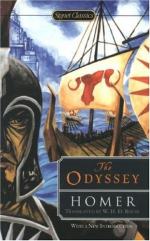Swift to the queen returns the gentle swain:
“And say (she cries), does fear or shame detain
The cautious stranger? With the begging kind
Shame suits but ill.” Eumaeus thus rejoin’d:
“He only asks a more propitious hour,
And shuns (who would not?) wicked men in power;
At evening mild (meet season to confer)
By turns to question, and by turns to hear.”
“Whoe’er this guest (the prudent queen
replies)
His every step and every thought is wise.
For men like these on earth he shall not find
In all the miscreant race of human kind.”
Thus she. Eumaeus all her words attends,
And, parting, to the suitor powers descends;
There seeks Telemachus, and thus apart
In whispers breathes the fondness of his heart:
“The time, my lord, invites me to repair
Hence to the lodge; my charge demands my care.
These sons of murder thirst thy life to take;
O guard it, guard it, for thy servant’s sake!”
“Thanks to my friend (he cries): but now
the hour
Of night draws on, go seek the rural bower:
But first refresh: and at the dawn of day
Hither a victim to the gods convey.
Our life to Heaven’s immortal powers we trust,
Safe in their care, for Heaven protects the just.”
Observant of his voice, Eumaeus sate
And fed recumbent on a chair of state.
Then instant rose, and as he moved along,
’Twas riot all amid the suitor throng,
They feast, they dance, and raise the mirthful song
Till now, declining towards the close of day,
The sun obliquely shot his dewy ray.
BOOK XVIII.
Argument.
The fight of Ulysses and Irus.
The beggar Irus insults Ulysses; the suitors promote the quarrel, in which Irus is worsted, and miserably handled. Penelope descends, and receives the presents of the suitors. The dialogue of Ulysses with Eurymachus.
While fix’d in thought the pensive hero sate,
A mendicant approach’d the royal gate;
A surly vagrant of the giant kind,
The stain of manhood, of a coward mind:
From feast to feast, insatiate to devour,
He flew, attendant on the genial hour.
Him on his mother’s knees, when babe he lay,
She named Arnaeus on his natal day:
But Irus his associates call’d the boy,
Practised the common messenger to fly;
Irus, a name expressive of the employ.
From his own roof, with meditated blows,
He strove to drive the man of mighty woes:
“Hence, dotard! hence, and timely speed thy
way,
Lest dragg’d in vengeance thou repent thy stay;
See how with nods assent yon princely train!
But honouring age, in mercy I refrain:
In peace away! lest, if persuasions fail,
This arm with blows more eloquent prevail.”
To whom, with stern regard: “O insolence,
Indecently to rail without offence!




